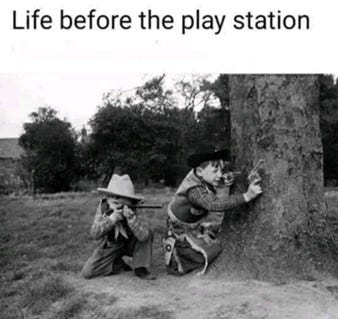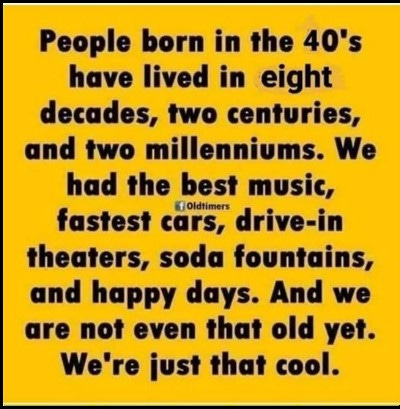I get many nostalgia pieces about how wonderful life was back in the fifties. Internet groups like ‘born in the forties, raised in the fifties,” lament the passing of the good old days, while looking with sadness at the current generation. The most common theme is that technology has destroyed childhood. “We were the lucky generation… typifies that sentiment.
These reminiscences are often from the Bronx, portraying life in New York as something akin to the garden of Eden. The nostalgia of these reminiscences has a soft intensity, tinged with a wistfulness for a time in that was idyllically happy, peaceful, safe, and full of wonder. An undercurrent of malaise flows between the lines, not only for that lost world, and not only because it reminds us of our own mortality, but because our children and grandchildren will never understand the lives we lived, and how their lives today have shriveled into electronic, isolated cubicles where community is a zoom meeting, and social interaction is a series of often semi-literate Facebook posts.
Here’s another.
And another…
We didn’t stare at screens: we interreacted with other kids, we played outside; we didn’t draw the curtains, flick on the machine and fall into a stupor.
While today’s grandparents fully recognize the utility of personal computers and cell phones, we still feel warm and fuzzy about our black and white, rabbit ears television with only six stations.
Here’s another….
Remember when the doctor
used to be the family friend,
and didn't need insurance
or a lawyer to defend?
We only had one TV set
and channels maybe two,
But always there was one of them
with something worth the view.
Oh, the simple life we lived
still seems like so much fun,
how can you explain a game,
just kick the can and run?
This life seemed so much easier
and slower in some ways.
I love the new technology
but I sure do miss those days.
So time moves on and so do we
and nothing stays the same,
but I sure love to reminisce
and walk down memory lane.
In that idealized past, parents didn’t worry about kids being kidnapped or molested. After school was time to play; “just be home by five.” When I was five-years old, my mother regularly sent me to Mr. Zimmerman’s grocery store a long two blocks away., where I’d hand Mr. Zimmerman the note, pick up the loaf of bread, and walk all the way back. Maybe our parents were naïve, but there was no fear.
On Saturdays, when I was in third or fourth grade, my friend Jay and I would pack a lunch and take hikes. We didn’t hike in the woods or to a fishing hole. We walked up the Grand Concourse passed the ornate Loews Paradise theater, where we later graduated from high school, to Fordham Road and on into Westchester. Each week, we walked further, until one day we found ourselves six miles from home. We managed to find a phone booth to call my dad who picked us up.
They weren’t worried at all.
Today’s insistence on bicycle helmets, starting with toddlers, seems over the top. We rode our heavy Schwinn bikes all over the place; up hills, down hills, to friends on the next block, into the school yard, up the concourse to Hebrew School, and around the block. As one Boomer website put it:
No helmet, no elbow pads, no kneepads and no fear! We didn’t wear helmets because they didn’t exist.
On the other hand, New York in the fifties had its own brand of fear – an atomic holocaust.
At the end of our street on Creston Avenue and 181st Street, a six-foot silver structure went up, almost overnight. It looked like a little spaceship pointing to the stars. It turned out to be a siren. They sprouted all over the city to warn us that the Russians were going to drop an atomic bomb on New York. If the siren went off in the middle of a stickball game in the middle of the street, we were supposed to run for cover in the nearest building. Little black and yellow shelter signs sprung up on apartment buildings throughout the city. Even as a kid, I didn’t believe I would survive, basement shelters notwithstanding. (Besides, the building’s “super” was about eight feet tall, and would surely have chased us out.)
Every so often, late at night, I would hear sirens wailing their mournful songs of death. Sometimes I tried to calculate my chances of survival. Assuming that the Empire State Building was the target, and the Bronx was a good distance away, I might survive the initial blast, but the radiation would surely get me. If they miss the Empire State Building and hit the Bronx directly, I’ll be incinerated. If they screw up and hit Brooklyn, I might have a chance, but the chaos and barbarism that would surely follow would probably destroy my whole family anyway.
Some sirens were loud, others howled faintly in the distance. I always told myself, “It’s just a test.” But what if it isn’t? Why would they be doing a test in the middle of the night? Lying in bed, I’d look out the fire escape window and wonder if the last thing I ever saw would be a searing flash, melting my eyeballs and announcing the end of the world. When the sirens ended, I’d turn over and go to sleep.
Adding to the ongoing fear were “shelter drills” which gave us fifteen minutes before atomic destruction. The teachers marched us silently into the hall where we lined-up along the wall but not in front of the classroom doors. Absolute silence was required. (Maybe the Russians won’t hear us if we’re real quiet.)
These days fear is everywhere: child molesters, kidnappers, crazed gunmen, school shooters, terrorists, germs, global warming, litigation, medical malpractice suites, a hostile work environment, male toxicity, and another round of COVID-19. Back in the fifties, we only worried about the Russians, atomic holocausts, Communists (whatever that was), post-apocalyptic chaos and nuclear altered mutant zombies.
At least you knew where you stood with zombies.
In spite of these worries, I had a general sense that the world was safe and secure. Looming above us was a network of parents, teachers, the principal, the police, and somewhere far off was President Eisenhower. Adding to my sense of security was the United Nations. I wasn’t quite sure what it was, but the building itself, with its clean lines and solid rectangular shape, left me with a sense of purity, strength, cleanliness, safety and permanence. Even the letters UN, like the building itself, were tall, simple, strong and reassuring. Related to that was a thing called NATO. I had no idea what that was either, but those four tall block letters evoked comfort in a dangerous world. As long as the UN and NATO were around, nothing could hurt us. Life was fair, orderly and secure. Friends were always around; acceptance and belonging were as natural a part of existence as the buildings that towered over us.
Just today, July 30, 2024, a CBS new story appeared on my phone. (OK, I admit it, the phone is a marvel that sucks me in and swallows me up. I’m as addicted as everyone else.) According to the news story, the National Survey on Drug Use and Health, almost one in three adolescents, received mental health treatment in 2023. That translates to around 8.3 million adolescents who are being treated with counseling and medication. Every year around 100,000 die of fentanyl poisoning.
The numbers are grim. In 2023, 13.9 percent of teens were taking prescriptions for mental health, for adults these mood-altering drugs, rose from 21.8 % in 2022 to 23% last year. I would guess that considerably more could use mental health treatments who never seek it.
In addition, the decline in happiness, religion, family, marriage, patriotism, civility, standardized test scores, and the low level of political discourse, ae signs of a civilization in decline. Life is not supposed to be this way. Is it any wonder that today’s Boomers approaching their eighties, shake their heads and wish it was 1958 again?
The fifties have become idealized, almost mythological. “Could it all have been so simple then, or has time rewritten every line… sang Barbara Streisand, implying that, yes, it probably wasn’t as good as we think it was. Should we resurrect the idealized version past, or just leave it alone? I’d say, resurrect it all you want. It was your life as you remembered it. And what you remembered was good. One web site has over 850,000 members. They want to talk about those days, something I’m doing right now.
By today’s standards, many of us were poor. But, as one website put it, “as we grew prosperous, we lost trust in one another. As we found diversity, we lost our sense of community.”
Just in case you missed the point…
Post Script: I’d like to give a shout out to Substack writer, Graciewilde, who got me thinking about the nostalgic past.
Graciewilde replied to your comment on To Be Real Again.
Thank you so much for your thoughtful response, Fred. I hear what you are saying about the idealized past. I think as a society we are better off now than in that era. Individuals, however, might have enjoyed those years more (especially if they were relatively free of responsibility. I look forward to seeing your post on this. I think my impetus in writing this was an acknowledgement that my life has been rich in positive experiences. As an older person, I look back on the things that I could and did do then and compare to my experiences now. They are different, not necessarily better or worse (although memory plays that trick that suggests life WAS better back then 🤣). What I know to be true is that I have much to be grateful for.
For further observations on gratitude, control / click here










The world has changed so much that the past is almost like a different planet. And, yes, one of those changes to America is that the existential threat has gone from being external to being internal.
The word that comes immediately to mind is poignant. Our memories hold on to some ideas, some images and our present moment reality often doesn't live up to the past. I recently re-read Yuval Noah Harari's book Sapiens. I think human beings were at their peak of joyful living 70,000years ago when they were in the hunting and gathering world. They spent 35-40 hours a week in the chores of living and then had time to notice and interact with the natural world around them. Yes, they often (though not always) died younger . A strong percentage of children didn't make it to 12 years old but hey, it was a rich life while it was being lived. 🤷🏻♀️. Thank you again for the thoughtful piece, Fred.